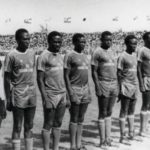By Christopher Burke
Fashion has long been a potent force for social change and empowerment. It transcends aesthetics and serves as a medium for self-expression, identity and societal commentary. Throughout history, fashion has mirrored and influenced social movements from the suffragettes’ white dresses symbolizing purity and equality to the 1960s counterculture’s embrace of free-spirited, anti-establishment styles. In Africa, fashion is more than a creative outlet–it is a catalyst for empowerment, economic growth and cultural representation. The continent’s vibrant fashion industry is transforming lives and communities, promoting gender equality and reshaping global perceptions of African identity.
The fashion industry in Africa plays a crucial role in creating jobs and supporting local communities. It encompasses a wide range of activities, from textile production and garment manufacturing to design and retail. This sector provides livelihoods for millions of people, particularly in countries with rich textile traditions such as Nigeria, Ghana and Ethiopia.
Aisha Ayensu, founder of the Ghanaian fashion brand Christie Brown is a compelling example. Ayensu’s brand not only showcases contemporary African designs, but employs numerous artisans and tailors, providing them with stable incomes and skill development opportunities. Her work has helped lift many out of poverty, offering a pathway to economic independence.
Ethiopian model and entrepreneur Liya Kebede founded Lemlem in 2007, a fashion brand that employs traditional weavers in Ethiopia. Lemlem’s mission is to preserve the art of weaving while creating sustainable jobs for artisans. Lemlem empowers its workers and contributes to the local economy with fair wages and ethical working conditions.
The fashion industry is a very powerful vehicle for empowering African women and youth. Numerous initiatives and organizations focus on supporting these groups, recognizing their potential to drive economic and social change. The African Fashion Foundation offers mentorship and funding opportunities to emerging designers with a particular emphasis on women and young people.
Amaka Osakwe, the Nigerian designer behind the brand Maki Oh presents another notable success story. Osakwe’s designs blend traditional Nigerian techniques with contemporary aesthetics. She has garnered international acclaim and empowered other young African designers to pursue their creative dreams. The success of Maki Oh demonstrates the potential for African fashion to achieve global recognition while fostering local talent.
The Malawian brand MIA by Mia Nisbet exemplifies youth empowerment in fashion. Nisbet collaborates with young local tailors and designers, providing them with the skills and resources needed to create sustainable, marketable products. By mentoring and supporting these young creatives, MIA helps them build careers and gain financial independence.
Cultural representation in fashion is vital for promoting a positive and diverse image of African identity globally. African fashion celebrates the continent’s rich cultural heritage, incorporating traditional textiles, patterns and techniques into contemporary designs. These fusion preserves cultural practices and challenges stereotypes reshaping global perceptions of Africa.
Designers such as South Africa’s Laduma Ngxokolo of MaXhosa draw inspiration from their cultural heritage to create modern, stylish garments. Ngxokolo’s work showcases the beauty and sophistication of Xhosa culture helping to redefine African fashion on the global stage.
Platforms such as the Lagos Fashion Week and Dakar Fashion Week provide opportunities for African designers to showcase their work to an international audience. These events highlight the diversity and creativity of African fashion, promoting cultural exchange and understanding.
Despite its potential, the African fashion industry faces several challenges. Barriers to growth include limited access to funding, inadequate infrastructure and the dominance of fast fashion that undermines local craftsmanship. Nonetheless, these challenges also present opportunities for innovation and growth.
A significant opportunity lies in the growing global demand for sustainable and ethically produced fashion. African fashion’s emphasis on traditional techniques, natural materials and sustainable practices positions it well to meet this demand. By investing in eco-friendly technologies and promoting ethical production, African designers appeal to conscientious consumers worldwide.
Collaborations between African designers and international brands can enhance visibility and market access. The collaboration between Ghanaian designer Osei-Duro and U.S.-based retailers has introduced African fashion to new markets, fostering cross-cultural appreciation and economic growth. The rise of digital platforms also offers new avenues for African fashion. E-commerce and social media enable designers to reach global audiences directly, bypassing traditional retail barriers. These platforms can amplify African voices, showcasing the continent’s creativity and innovation.
The African fashion industry is a dynamic force for social empowerment, economic development and cultural representation. By creating jobs, supporting women and youth and promoting a positive image of African identity, fashion is transforming lives and communities across the continent. The industry’s potential for growth and global influence is immense. As African designers continue to innovate and inspire, they help sculpt the future of fashion, drive social change and foster global unity. Africa is empowering itself and the world though style.
Christopher Burke is a senior advisor at WMC Africa, a communications and advisory agency located in Kampala, Uganda. With nearly 30 years of experience, Christopher has worked extensively on social, political and economic development issues focused on the environment, agriculture, land governance, communications and peace-building in Asia and Africa.








